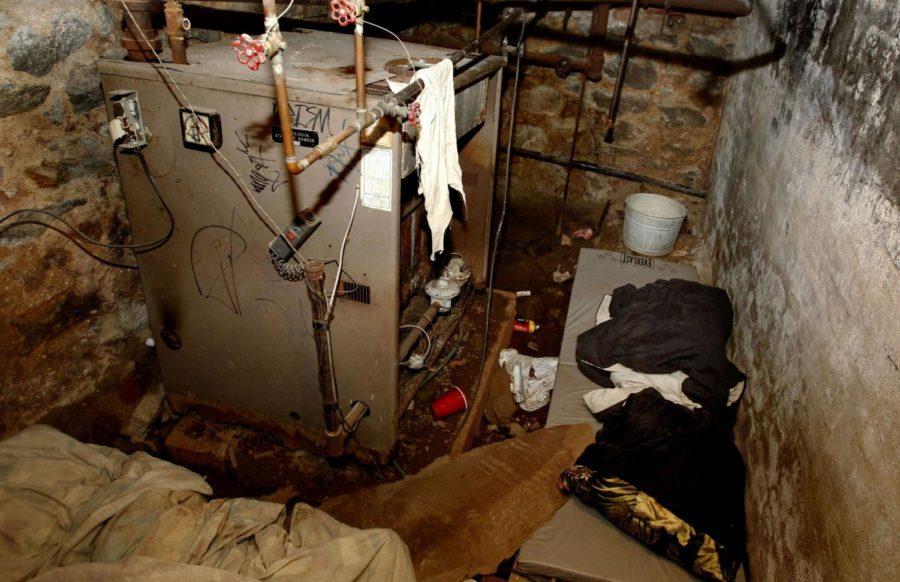Hearing set for suspects charged with imprisonment of disabled adults
Scene of conditions inside the basement of the recent incident in Philadelphia involving four victims held captive.
October 24, 2011
PHILADELPHIA – A preliminary hearing is scheduled for Dec. 19 for three suspects charged with imprisoning four mentally disabled adults in the basement boiler room of a Philadelphia apartment building, the attorney for one suspect said.
The hearing was scheduled at a status hearing Monday, said George S. Yacoubian Jr., who represents Linda Ann Weston, 51.
Weston and two other suspects – Gregory Thomas, 47, and Eddie Wright, 49 – face charges including criminal conspiracy, aggravated assault, kidnapping, criminal trespass, unlawful restraint and false imprisonment after the landlord of the apartment building found the four people locked in the 15- by 6-foot room with no food and only a bucket for a toilet, police said.
Weston, Thomas and Wright did not appear in court Monday, Yacoubian said.
A fourth suspect – Jean McIntosh , Weston’s daughter – faces similar counts, but was charged a few days after the first three. A hearing in McIntosh’s case is scheduled for Wednesday, according to court records.
Police have said the suspects may have been holding seven other people, including Weston’s 19-year-old niece and six children. Police believe two of the children, ages 2 and 5, may belong to Tamara Breeden, one of the four adults rescued from the sub-basement.
Yacoubian said he met with Weston recently. “Overall, she’s fatigued,” he said. “She appears to be in relatively good spirits, and that’s all I’m going to say.”
He plans to meet with her again this week, and said the next step is for him to decide if a competency hearing for Weston is warranted.
Asked about a defense, Yacoubian said, “It’s way too early to discuss. We all know that the allegations here are serious. … I’m not privy to anything in the way of evidence at this point. All I have is a one-paragraph summary of what the allegations are.”
Thomas’ attorney, Perry deMarco Jr., said he interviewed his client for several hours and that he appeared to understand the questions and provide answers. “I’m not a doctor, but I don’t see competency being an issue,” he said.
Authorities are looking into whether the suspects stole Social Security checks from the alleged victims.
Police were told nearly eight years ago about a possible kidnapping involving Weston, the accused ringleader of the group, according to an attorney for Breeden’s family.
Lawyer Steven Wigrizer told CNN that Breeden’s mother contacted police in 2003 after she was told her missing daughter and Breeden’s boyfriend, Edwin Sanabria, may have been kidnapped by Weston.
Philadelphia police did not respond when contacted Sunday by CNN about Wigrizer’s statements.
Weston served prison time in the 1980s for killing her sister’s boyfriend by locking him in a closet and refusing to feed him. Court documents show Bernardo Ramos, 25, was fed only four times while locked in the closet over the two-month period. He died in 1981 weighing less than 75 pounds. His body was found in an abandoned building after it was wheeled there in a baby carriage, according to the documents.
Weston was paroled in 1987 after serving four years in prison, according to Leo Dunn of the Pennsylvania Board of Probation and Parole. As part of the release, the parole board wrote that Weston was required to receive psychiatric treatment, he said.
Later that year, records show Weston violated a condition of her probation, although Dunn wasn’t sure of the specifics. She was sent back to prison, then paroled once more with a “highly structured plan for psychiatric care,” Dunn said.
But in 1988, she stopped reporting to a parole officer. Her case was put in “absconder” status, and she was later declared “delinquent.”
In 1993, 10 years after her initial conviction, the board canceled the delinquency when Weston reached her maximum sentence date, per its policy.
“Sometimes (parole violators) get out there and go underground, and as long as they behave themselves and don’t do anything that comes to the attention of authorities, we have a hard time finding them,” Dunn said.







